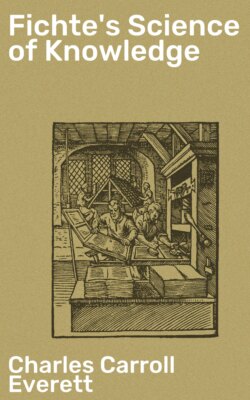Читать книгу Fichte's Science of Knowledge - Charles Carroll Everett - Страница 7
На сайте Литреса книга снята с продажи.
CHAPTER II.
ОглавлениеTable of Contents
PROBLEMS: CONSIDERED IN RELATION TO KANT.
THE reader of Kant’s “Critique of Pure Reason,” after toiling as best he can through analyses and abstractions, is pleasantly surprised by a picture which Kant suddenly conjures up before his imagination. It is that of an island, “The Land of Truth” (a charming name), and of the stormy and misty sea by which it is surrounded—a sea that tempts ever to fascinating, if fruitless, adventures.[1] Not only had Kant, according to his just boast in this passage, explored and mapped out this island, but, if I may venture to carry out the figure a little further, upon it he had established a kingdom.
Fichte was among the first to yield enthusiastic allegiance to the new ruler. He devoted to Kant’s service the full power of his maiden lance. He even assumed the place of chief lieutenant to his leader, and this, at first, not wholly without the encouragement of Kant himself. He soon found, however, that much remained to be accomplished, and that, if he would maintain the authority of his master, he must complete his work. He set himself to traverse regions that remained unexplored, to subdue unconquered or rebellious territories, to codify the laws; in a word, to introduce order into the whole empire. Of course, he could not do this without bringing changes into the laws and methods of the realm. These seemed to him so essential that he adopted them without hesitation, and in good faith. To his surprise, however, his master failed to recognize his service. He even found himself declared a rebel and an outlaw. Then first did he feel himself compelled, in order to accomplish the purposes he had at heart, to set up an empire of his own.
By this illustration, I have attempted to present, in as vivid a manner as possible, the relation of Fichte to Kant. Fichte, as we have seen, resolved to devote the best years of his life to the promulgation and defence of the critical philosophy. He, however, could teach nothing that he did not absolutely understand; and defend nothing that he could not wholly believe. If he was to become the expounder of the new philosophy, this philosophy must be completely wrought over in his own mind, so that it should come forth as his own philosophy. It must be perfectly transparent and perfectly organized. It must become a unit according to his idea of unity. In accomplishing this result, all the imperfections of the system of Kant were forced upon his attention. Whether or not he may be regarded as having been successful in his attempt to complete the philosophy of Kant, at least it is true that this attempt, though made in a positive rather than in a negative sense, remains one of the best criticisms upon the work of Kant. Qui s’excuse s’accuse; in like manner his effort to fortify the weak places in Kant’s system reveals them. These weak places Fichte sometimes covers by a new interpretation of the teaching of Kant, which he defends, not so much by an examination of the words of the master, as by insisting that any other meaning than that which he suggests would be absurd. If his explanation does not express the real thought of Kant, it may well be understood that this is a kind of defence which no author would welcome. Sometimes he reconstructs parts of the system, of which the construction had seemed imperfect. The whole arrangement he puts upon a new basis. Thus, while undertaking, in good faith, to defend the old system, he was really founding a new. Kant must have witnessed with some surprise the growth of this new philosophy which claimed to be his own.
One great difference between the new form and the old sprang from the fresh life that was put into the system. Fichte poured into it his whole eager and impetuous soul. The work which Kant had shaped with his careful chisel, pausing only now and then to admire its fair proportions and the dignity of its bearing, has suddenly sprung into life. It is not strange that in this living and breathing form, in these features aglow with the fire of a lofty enthusiasm, Kant failed to recognize the work of his own hand. How far the work remained the same, and how far it was indeed transformed by the process which it had undergone, we shall discover as we advance.
We have now to inquire what were some of the most important problems which, in the judgment of Fichte, Kant had left unsolved, and to which he was forced to seek an answer.
